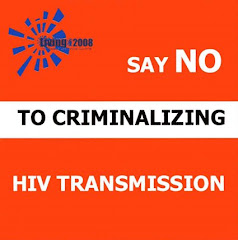 |
| Read the entire ruling R. v. Ratt [2012] SKPC 154, S.J. No. 590 |
A Canadian judge in the province of Saskatchewan has ruled that spitting in the face of a police officer is a simple assault that does not result in a risk of serious diseases such as HIV, hepatitis C or herpes.
According to a CBC report
The Crown argued that there was a risk, although minimal, that the officer could have become infected with HIV, hepatitis C or herpes. She underwent considerable anxiety, visited a doctor and had to wait two weeks before she found out she was going to be OK.Canada and the United States have far outpaced most other countries in attempting to prosecute HIV-positive people for spitting, notably for spitting at arresting officers. The most notorious case comes from the United States (the 2008 Willie Campbell case in Texas) but between 1993 and 2006, there were six arrests or prosecutions of people living with HIV for spitting in Canada, representing 10% of all criminal potential or perceived 'HIV exposure' cases during that period.
The Crown pointed to previous cases where people who spat at police officers received jail sentences. The prosecutor pushed for the maximum sentence of six months for Ratt.
Instead, earlier this week La Ronge provincial court Judge Felicia Daunt sentenced her to time already served — five days — and six months probation.
"I want to be clear that I am in no way trivializing the well-being of police officers or minimizing the very real risks they face on a daily basis," Daunt wrote in her nine-page decision. "They have an extremely stressful job." However, it's an "urban myth" that police get serious injuries after being spat at and the intense anxiety that officers and their families feel about saliva is not justified, she said.
Laboratory studies have found that saliva may contain HIV, and transmission via saliva is therefore biologically plausible. However, there is absolutely no epidemiological evidence to suggest that spitting on someone could expose them to enough HIV for infection to result. Levels of HIV in saliva are not high enough to allow transmission, even if the saliva comes into contact with a mucous membrane such as that of the eye. Spitting into someone's mouth would create the same risk as kissing – zero. The CDC recently updated its website to highlight HIV-related risks in the context of criminal prosecutions, and notes that spitting poses a 'neglible' risk of HIV exposure.
In this particular case, however, there was no evidence that the accused had HIV or any other communicable disease. Instead, the Crown wanted to use her as an example and have the judge sentence her to six months in prison to deter others from spitting on cops during their arrest.
“Those who get arrested on a regular basis know the police are terrified of getting spit on. That's why they do it. They use that fear against the officers. A detainee can threaten a police officer, he can try to hit him, and not bother that officer one bit. So if a detainee can put the fear of death into an officer simply by spitting on him or her, he is going to do it. In other words, these spitting incidents are increasing because of the fear. If we want to deter suspects from spitting on police officers, we need to educate these officers about the real risks involved, and not perpetuate their anxiety by repeating urban myth."Judge Duant's reliance on science and not stigma is very much appreciated. Let us hope that Canada's Supreme Court is similarly enlightened when it delivers its judgments in the Mabior and DC appeals this Friday, October 5th. The decision will be available as of 9:45 am 9.45 EST (15.45 CET) on the Supreme Court's website at http://scc.lexum.org/en/index.html.








0 comments:
Post a Comment